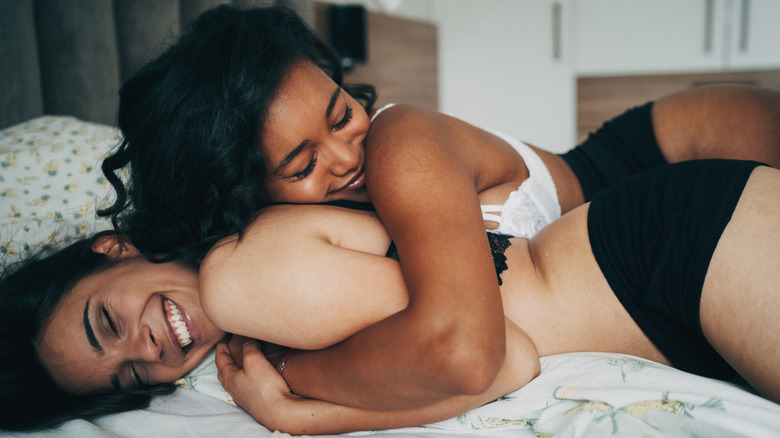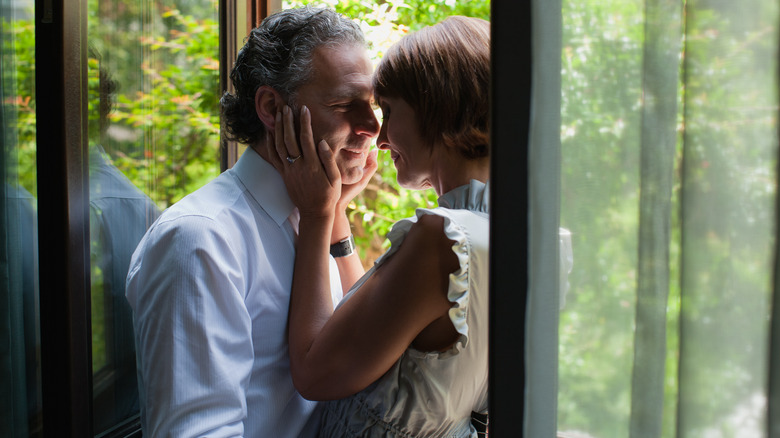Responsive Desire: Why You Only Feel Turned On Once You Start Hooking Up
Human sexuality isn't just one thing or another. Instead, it's a very wide spectrum of dozens, if not hundreds of ways people enjoy sex and what sex means to them. Arousal and desire, too, are on that spectrum, meaning there's no one way to be aroused or experience desire.
"There are two ways that we get turned on and ready for sex: In our heads and in our bodies," sex therapist Vanessa Marin told Well + Good. "We need the mental desire for sex, and we need the physical arousal for sex. Desire and arousal sound pretty similar, but they work independently of each other. Sometimes they can even work in opposite directions."
One of those types of desire is responsive desire. With responsive desire, you don't become mentally aroused until you feel physically aroused. For some, this can mean going through a whole session of engaging in foreplay and maybe not becoming aroused until some form of penetration, because the desire just doesn't hit right away. It's something that, although very normal, confuses people who experience it. But not only is it very normal, there's a very good reason for it.
How responsive desire works
What we see in the media quite a bit is spontaneous desire. You have two people going at it and both appear to be on the same page in regards to wanting each other. In these portrayals of what sex is, the brain is ready to go, then the body follows. But for those with responsive desire, the brain only gets interested as a response to the body experiencing pleasure. The brain, after all, is the biggest sex organ in the body, so it needs to be on board if the physical is going to be enjoyable. But that doesn't mean that desire and arousal need to show up at the same time for it to be good.
"Sex, and our desire to participate in it, is affected by our psychological landscape, including our mindset and past experiences," queer sex educator Whitni Miller told Cosmopolitan. "The programs in our society, such as shame from purity culture, fear of unwanted pregnancy, and performance anxiety, are all factors that affect whether we can get motivated for sex or not."
According to a 2010 study published in The Journal of Sex Medicine, 30.7% of women can only "access" their sexual desire after they're aroused (responsive desire). As the research found, it's this response that motivates women to want to have sex, as opposed to wanting it just out of the blue. The same study found that only 15.5% of women have spontaneous desire, something that's more common in men.
Sexual desire can change
Interestingly, just because you have responsive desire now doesn't mean it's set in stone. Like all things related to sex, you can experience a change in your desire and what it takes to become aroused because these things are fluid. This is most notably the case when it comes to women.
According to a 2023 study published in the Archives of Sexual Behavior, women experience different types of sexual desire throughout their lives, whereas men's sexual desire stays pretty much the same. Desire can be affected by age, physical and mental health, as well as daily stress levels. So if you're wondering if you'll ever be aroused and craving sex without anything being initiated at all, it can happen. It's just that you can't force it to happen.
It's important to note that responsive desire is not the same as having a low or absent libido. Responsive desire is just one person's own unique way of experiencing their libido. Equally important to understand is that no type of desire is better than the other. It's simply the way our bodies and minds interpret sexual wanting and display arousal. Even if you and your partner don't share the same kind of desire, that's not a bad thing. It just takes some understanding on both your parts so you can meet in the middle and have a healthy and happy sex life, no matter what kind of desire it takes you both to get there.


